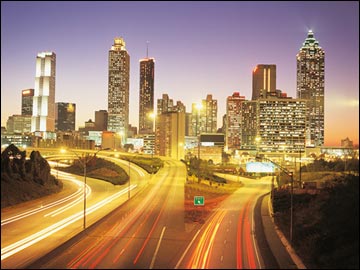
Despite a 10 percent unemployment clip and an annual median income that is approximately half of their white counterparts, there are pockets of success that blacks can point to.
Forbes magazine undertook a comprehensive study of the economic landscape of America’s 52 largest metropolitan areas that present African-Americans with the best opportunities, and used three factors: homeownership, entrepreneurship, as measured by the self-employment rate, and median household income data from 2013. A fourth category, demographic trends, measuring the change in the African-American population from 2000 to 2013 in these metro areas, judges how the community is “voting with its feet.”
Atlanta was determined to be the No. 1 city in America where Blacks are doing the best, based on the detailed criteria.
For Blacks, the unemployment rate was 10.4 percent in December, more than twice that of whites, as it has been for the better part of the last 40 years. African-Americans’ real median household income toggled up to $34,598 last year, which is about 59 percent that of whites, a ratio that has also not varied much since the Census Bureau began tracking this data in 1967, according to Forbes magazine.
Forbes reports: “The city, which in the 1960s advertised itself as ‘the city too busy to hate,’ has long lured ambitious African-Americans. With its well-established religious and educational institutions, notably Spelman and Morehouse Colleges, which are ranked first and third respectively, by US News among the nation’s historically black colleges, the area has arguably the strongest infrastructure for African-American advancement in the country. The region’s strong music and art scene has also made it an ‘epicenter for Black glitterati’ and culture.
“The superlatives extend well beyond glamour to the basics of everyday life. Some 46.9% the metro area’s black population owned their own homes as of 2013, well above the 38% major metro average for African-Americans. Atlanta’s African-Americans have a median household income of $41,800, also considerably above the major metro average, while their rate of self-employment, 17.1%, is second only to New Orleans. Clear evidence of the Atlanta area’s appeal can be seen in the growth of the black population, up 50% from 2000 through 2013.”
Raleigh, N.C. is No. 2 on the list, with a median income of $42,285, home ownership rate of 46.7 and a 55.9 percent change in population from 2000 to 2013.
Washington, D.C. follows in third.
Forbes: “Washington’s black community has strong institutions of culture and higher education. The District is home to Howard University, the nation’s second-ranked historically black university. Washington’s urban core may be becoming less black—down from 60% in 2000 to under 50% in 2013—but this has been more than made up for by the burgeoning population of surrounding suburban areas such as Prince George’s County, which is majority black and relatively prosperous, with poverty rates well below those of the city.”
Rounding out the top 10 are Baltimore at No. 4, Charlotte at No. 5, Norfolk-Virginia Beach sixth, Orlando seventh, Miami, Richmond and San Antonio tied for eighth.